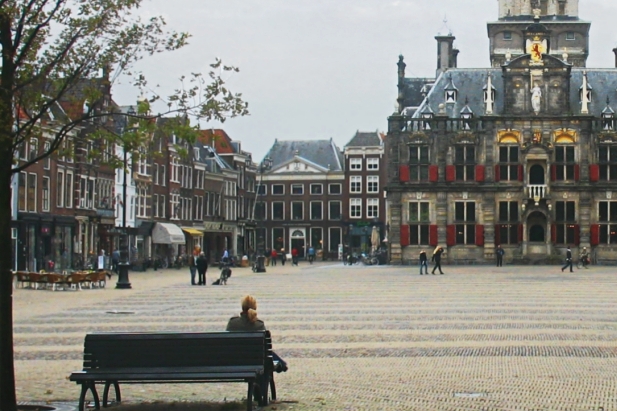


| |
The city of Delft, South Holland   
No town is richer than Delft in associations that appeal to many different types of mind. The traveller whose main purpose is to note characteristic national features, finds Delft quite as interesting as Leyden or Haarlem, though differing much from both. The lover of Dutch architecture finds much to note in such buildings as the Gemeenlandshuis, the Town Hall and the New Church. The compact, clean little town is rich in studies for the artist of today, and full of associations connected with past story of Dutch art.
No man who is even partially acquainted with the thrilling story of Dutch history, can go otherwise than as a reverent pilgrim to the town whose streets "Father William", William the Silent, trod so often, to the house where he lived and where he died, to the church the St. Denis of Holland which witnessed the solemn ceremonials of his own funeral, and to which, one by one, his chief descendants have been brought. Delft is a place of some importance in Holland, having about 27,000 inhabitants, and is a pleasant town to visit, because it is compact, its topography is easily mastered, and on all sides it presents signs of prosperity.
Reaching Delft by train, the road from the station crosses one or two canals, and leads to what is called Old Delft, a canal bordered on either side by a roadway and shaded by lime-trees. This is the old aristocratic street of Delft. Here, John Olden Barneveld once lived; here is the farfamed Prinsenhof; here is the Old Church, with the leaning tower; and here is the old hall in which the first parliament of the Dutch Republic met.
Delft was the scene of several very important transactions in the struggle that resulted in freeing the country from the yoke of Spain. In October, 1575, the Estates met there, under the presidency of William the Silent, and resolved "that they would forsake the king (Philip II), and seek foreign assistance." "Thus," writes Motley, "the great step was taken by which two little provinces (Zealand and Holland) declared themselves independent of their ancient master. That declaration, although taken in the midst of doubt and darkness, was not destined to be cancelled, and the germ of a new and powerful commonwealth was planted."
| The New Church (Nieuwe Kerk) in Delft. |
| |
|















